2019年高考英语试卷
(完整)2019年高考英语全国1卷(附答案)
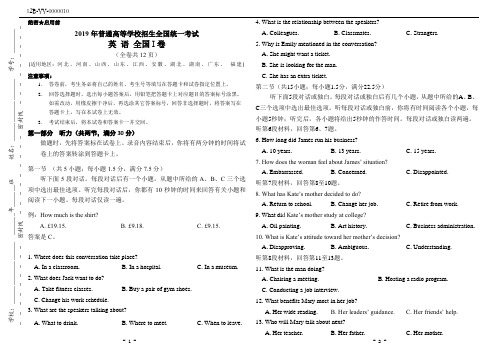
学校:____________________ _______年_______班 姓名:____________________ 学号:________- - - - - - - - - 密封线 - - - - - - - - - 密封线 - - - - - - - - -绝密★启用前2019年普通高等学校招生全国统一考试英 语 全国I 卷(全卷共12页)(适用地区:河北、河南、山西、山东、江西、安徽、湖北、湖南、广东、 福建) 注意事项:1.答卷前,考生务必将自己的姓名、考生号等填写在答题卡和试卷指定位置上。
2. 回答选择题时,选出每小题答案后,用铅笔把答题卡上对应题目的答案标号涂黑。
如需改动,用橡皮擦干净后,再选涂其它答案标号,回答非选择题时,将答案写在答题卡上,写在本试卷上无效。
3.考试结束后,将本试卷和答案卡一并交回。
第一部分 听力(共两节,满分30分)做题时,先将答案标在试卷上。
录音内容结束后,你将有两分钟的时间将试卷上的答案转涂到答题卡上。
第一节 (共5小题;每小题1.5分,满分7.5分)听下面5段对话。
每段对话后有一个小题,从题中所给的A 、B 、C 三个选项中选出最佳选项。
听完每段对话后,你都有10秒钟的时间来回答有关小题和阅读下一小题。
每段对话仅读一遍。
例:How much is the shirt?A. £19.15.B. £9.18.C. £9.15.答案是C 。
1. Where does this conversation take place? A. In a classroom. B. In a hospital.C. In a museum.2. What does Jack want to do?A. Take fitness classes.B. Buy a pair of gym shoes.C. Change his work schedule. 3. What are the speakers talking about? A. What to drink.B. Where to meet.C. When to leave.4. What is the relationship between the speakers?A. Colleagues.B. Classmates.C. Strangers.5. Why is Emily mentioned in the conversation? A. She might want a ticket.B. She is looking for the man.C. She has an extra ticket.第二节(共15小题;每小题1.5分,满分22.5分)听下面5段对话或独白。
2019年高考英语全国1卷(附答案)
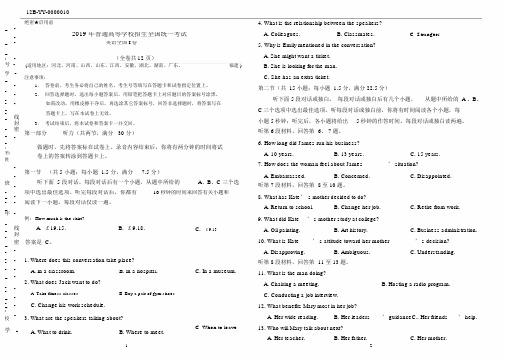
12B-YY-0000010-绝密★启用前__2019 年普通高等学校招生全国统一考试_-__-英语全国I卷__-(全卷共12 页):号 -(适用地区:河北、河南、山西、山东、江西、安徽、湖北、湖南、广东、福建 )学-注意事项:__-1.答卷前,考生务必将自己的姓名、考生号等填写在答题卡和试卷指定位置上。
___-2.回答选择题时,选出每小题答案后,用铅笔把答题卡上对应题目的答案标号涂黑。
___-如需改动,用橡皮擦干净后,再选涂其它答案标号,回答非选择题时,将答案写在___答题卡上,写在本试卷上无效。
_线__封3.考试结束后,将本试卷和答案卡一并交回。
__密_第一部分听力(共两节,满分 30 分)_-__做题时,先将答案标在试卷上。
录音内容结束后,你将有两分钟的时间将试:-名卷上的答案转涂到答题卡上。
姓--第一节(共 5 小题;每小题 1.5 分,满分7.5 分)-听下面 5 段对话。
每段对话后有一个小题,从题中所给的A、B、C 三个选班-__项中选出最佳选项。
听完每段对话后,你都有10 秒钟的时间来回答有关小题和_-__-阅读下一小题。
每段对话仅读一遍。
__4. What is the relationship between the speakers?A. Colleagues.B. Classmates.C. Strangers.5.Why is Emily mentioned in the conversation?A.She might want a ticket.B.She is looking for the man.C.She has an extra ticket.第二节(共 15小题;每小题 1.5分,满分 22.5分)听下面 5段对话或独白。
每段对话或独白后有几个小题,从题中所给的 A 、B、C三个选项中选出最佳选项。
听每段对话或独白前,你将有时间阅读各个小题,每小题 5秒钟;听完后,各小题将给出5秒钟的作答时间。
高考全国乙卷:《英语》2019年考试真题与答案解析

高考精品文档高考全国乙卷英语科目·2019年考试真题与答案解析同卷省份河南、山西、江西、安徽甘肃、青海、蒙古、山西吉林、宁夏、新疆、黑龙江高考全国乙卷:2019年《英语》考试真题与答案解析第一部分:听力做题时,先将答案标在试卷上。
录音内容结束后,你将有两分钟的时间将试卷上的答案转涂到答题卡上。
第一节::听下面5段对话。
每段对话后有一个小题,从题中所给的A、B、C三个选项中选出最佳选项。
听完每段对话后,你都有10秒钟的时间来回答有关小题和阅读下一小题。
每段对话仅读一遍。
例:How much is the shirt?A. £19.15.B. £9.18.C. £9.15.答案是C。
1. Where does this conversation take place?A. In a classroom.B. In a hospital.C. In a museum.2. What does Jack want to do?A. Take fitness classes.B. Buy a pair of gym shoes.C. Change his work schedule.3. What are the speakers talking about?A. What to drink.B. Where to meet.C. When to leave.4. What is the relationship between the speakers?A. Colleagues.B. Classmates.C. Strangers.5. Why is Emily mentioned in the conversation?A. She might want a ticket.B. She is looking for the man.C. She has an extra ticket.第二节:听下面5段对话或独白。
(精校版)2019年全国2卷英语高考试卷(含答案)

绝密★启用前2019年普通高等学校招生全国统一考试(全国2卷)英语注意事项:1.答卷前,考生务必将自己的姓名、准考证号填写在答题卡上。
2.回答选择题时,选出每小题答案后,用铅笔把答题卡上对应题目的答案标号涂黑。
如需改动,用橡皮擦干净后,再选涂其他答案标号。
回答非选择题时,将答案写在答题卡上,写在本试卷上无效。
3.考试结束后,将本试卷和答题卡一并交回。
第一部分听力(共两节,满分30分)做题时,先将答案标在试卷上。
录音内容结束后,你将有两分钟的时间将试卷上的答案转涂到答题卡上。
第一节(共5小题;每小题1.5分,满分7.5分)听下面5段对话。
每段对话后有一个小题,从题中所给的A、B、C三个选项中选出最佳选项。
听完每段对话后,你都有10秒钟的时间来回答有关小题和阅读下一小题。
每段对话仅读一遍。
例:How much is the shirt?A. £19.15.B. £9.18.C. £9.15.答案是C。
1. Where does the conversation probably take place?A. In a library.B. In a bookstore.C. In a classroom.2. How does the woman feel now?A. Relaxed.B. Excited.C. Tired.3. How much will the man pay?A. $520.B. $80.C. $100.4. What does the man tell Jane to do?A. Postpone his appointment.B. Meet Mr. Douglas.C. Return at 3 o’clock.5. Why would David quit his job?A. To go back to school.B. To start his own firm.C. To work for his friend.第二节(共15小题;每小题1.5分,满分22.5分)听下面5段对话或独白。
(完整word)2019年全国高考英语卷1(附答案)
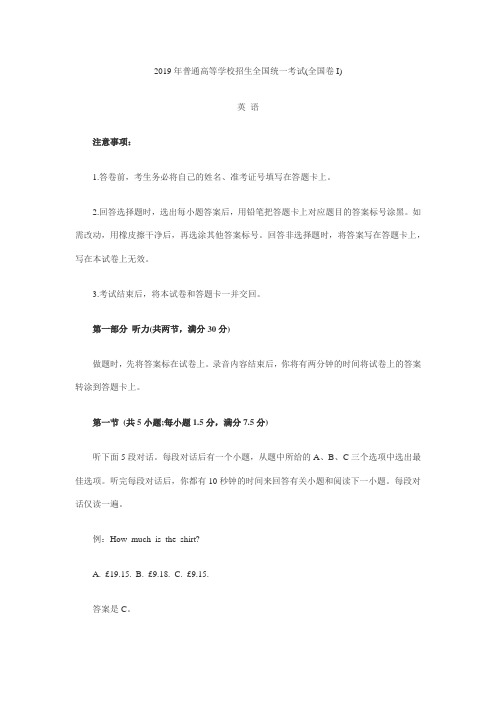
2019年普通高等学校招生全国统一考试(全国卷I)英语注意事项:1.答卷前,考生务必将自己的姓名、准考证号填写在答题卡上。
2.回答选择题时,选出每小题答案后,用铅笔把答题卡上对应题目的答案标号涂黑。
如需改动,用橡皮擦干净后,再选涂其他答案标号。
回答非选择题时,将答案写在答题卡上,写在本试卷上无效。
3.考试结束后,将本试卷和答题卡一并交回。
第一部分听力(共两节,满分30分)做题时,先将答案标在试卷上。
录音内容结束后,你将有两分钟的时间将试卷上的答案转涂到答题卡上。
第一节(共5小题;每小题1.5分,满分7.5分)听下面5段对话。
每段对话后有一个小题,从题中所给的A、B、C三个选项中选出最佳选项。
听完每段对话后,你都有10秒钟的时间来回答有关小题和阅读下一小题。
每段对话仅读一遍。
例:How much is the shirt?A. £19.15.B. £9.18.C. £9.15.答案是C。
1.Where does this conversation take place?A. In a classroom.B. In a hospital.C.In a museum.2.What does Jack want to do?A. Take fitness classes.B. Buy a pair of gym shoes.C. Change his work schedule.3.What are the speakers talking about?A. What to drink.B. Where to meet.C. When to leave.4.What is the relationship between the speakers?A. Colleges.B. Classmates.C. Strangers.5.Why is Emily mentioned in the conversation?A. She might want a ticket.B. She is looking for the man.C. She has an extra ticket.第二节(共15小题,每小题1.5分,满分22.5分)听下面5段对话或独白。
(完整版)2019年高考英语全国卷I及答案

2019年普通高等学校招生全国统一考试(全国卷I)英语注意事项:1.答卷前,考生务必将自己的姓名、准考证号填写在答题卡上。
2.回答选择题时,选出每小题答案后,用铅笔把答题卡上对应题目的答案标号涂黑。
如需改动,用橡皮擦干净后,再选涂其他答案标号。
回答非选择题时,将答案写在答题卡上,写在本试卷上无效。
3.考试结束后,将本试卷和答题卡一并交回。
第一部分听力(共两节,满分30分)做题时,先将答案标在试卷上。
录音内容结束后,你将有两分钟的时间将试卷上的答案转涂到答题卡上。
第一节 (共5小题;每小题1.5分,满分7.5分)听下面5段对话。
每段对话后有一个小题,从题中所给的A、B、C三个选项中选出最佳选项。
听完每段对话后,你都有10秒钟的时间来回答有关小题和阅读下一小题。
每段对话仅读一遍。
例:How much is the shirt?A. £19.15.B. £9.18.C. £9.15.答案是C。
1.Where does this conversation take place?A. In a classroom.B. In a hospital.C.In a museum.2.What does Jack want to do?A. Take fitness classes.B. Buy a pair of gym shoes.C. Change his work schedule.3.What are the speakers talking about?A. What to drink.B. Where to meet.C. When to leave.4.What is the relationship between the speakers?A. Colleges.B. Classmates.C. Strangers.5.Why is Emily mentioned in the conversation?A. She might want a ticket.B. She is looking for the man.C. She has an extra ticket.第二节(共15小题,每小题1.5分,满分22.5分)听下面5段对话或独白。
(完整版)2019年高考英语全国3卷(附答案)
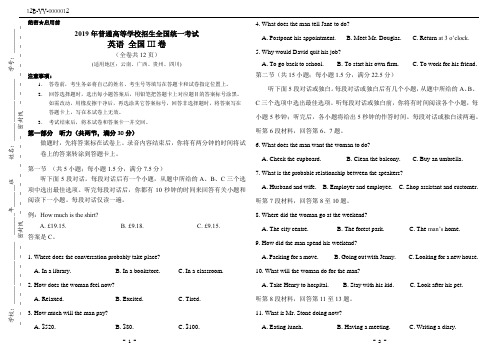
学校:____________________ _______年_______班 姓名:____________________ 学号:________- - - - - - - - - 密封线 - - - - - - - - - 密封线 - - - - - - - - -绝密★启用前2019年普通高等学校招生全国统一考试英语 全国III 卷(全卷共12页)(适用地区:云南、广西、贵州、四川)注意事项:1.答卷前,考生务必将自己的姓名、考生号等填写在答题卡和试卷指定位置上。
2. 回答选择题时,选出每小题答案后,用铅笔把答题卡上对应题目的答案标号涂黑。
如需改动,用橡皮擦干净后,再选涂其它答案标号,回答非选择题时,将答案写在答题卡上,写在本试卷上无效。
3.考试结束后,将本试卷和答案卡一并交回。
第一部分 听力(共两节,满分30分)做题时,先将答案标在试卷上。
录音内容结束后,你将有两分钟的时间将试卷上的答案转涂到答题卡上。
第一节 (共5小题;每小题1.5分,满分7.5分)听下面5段对话。
每段对话后有一个小题,从题中所给的A 、B 、C 三个选项中选出最佳选项。
听完每段对话后,你都有10秒钟的时间来回答有关小题和阅读下一小题。
每段对话仅读一遍。
例:How much is the shirt?A. £19.15.B. £9.18.C. £9.15.答案是C 。
1. Where does the conversation probably take place? A. In a library.B. In a bookstore.C. In a classroom.2. How does the woman feel now? A. Relaxed.B. Excited.C. Tired.3. How much will the man pay? A. $520.B. $80.C. $100.4. What does the man tell Jane to do?A. Postpone his appointment.B. Meet Mr. Douglas.C. Return at 3 o’clock. 5. Why would David quit his job?A. To go back to school.B. To start his own firm.C. To work for his friend. 第二节(共15小题;每小题1.5分,满分22.5分)听下面5段对话或独白。
2019年全国统一高考英语试卷(新课标Ⅰ)(含解析版)
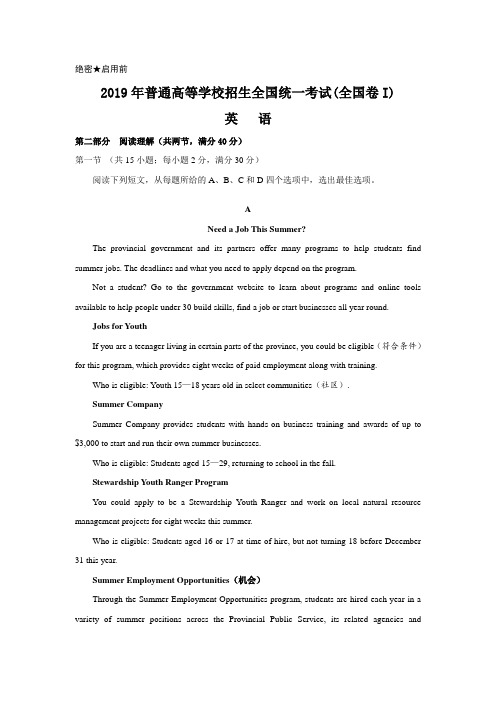
绝密★启用前2019年普通高等学校招生全国统一考试(全国卷I)英语第二部分阅读理解(共两节,满分40分)第一节(共15小题;每小题2分,满分30分)阅读下列短文,从每题所给的A、B、C和D四个选项中,选出最佳选项。
ANeed a Job This Summer?The provincial government and its partners offer many programs to help students find summer jobs. The deadlines and what you need to apply depend on the program.Not a student? Go to the government website to learn about programs and online tools available to help people under 30 build skills, find a job or start businesses all year round.Jobs for YouthIf you are a teenager living in certain parts of the province, you could be eligible(符合条件)for this program, which provides eight weeks of paid employment along with training.Who is eligible: Youth 15—18 years old in select communities(社区).Summer CompanySummer Company provides students with hands-on business training and awards of up to $3,000 to start and run their own summer businesses.Who is eligible: Students aged 15—29, returning to school in the fall.Stewardship Youth Ranger ProgramYou could apply to be a Stewardship Youth Ranger and work on local natural resource management projects for eight weeks this summer.Who is eligible: Students aged 16 or 17 at time of hire, but not turning 18 before December 31 this year.Summer Employment Opportunities(机会)Through the Summer Employment Opportunities program, students are hired each year in a variety of summer positions across the Provincial Public Service, its related agencies andcommunity groups.Who is eligible: Students aged 15 or older. Some positions require students to be 15 to 24 or up to 29 for persons with a disability.21. What is special about Summer Company?A. It requires no training before employment.B. It provides awards for running new businesses.C. It allows one to work in the natural environment.D. It offers more summer job opportunities.22. What is the age range required by Stewardship Youth Ranger Program?A.15—18.B.15—24.C.15—29.D.16—17.23. Which program favors the disabled?A. Jobs for Youth.B. Summer Company.C. Stewardship Youth Ranger Program.D. Summer Employment Opportunities.BFor Canaan Elementary’s second grade in Patchogue, N.Y.,today is speech day, and right now it’s Chris Palaez’s turn. The 8-year-old is the joker of the class. With shining dark eyes, he seems like the kind of kid who would enjoy public speaking.But he’s nervous."I’m here to tell you today why you should … should…"Chris trips on the"-ld,"a pronunciation difficulty for many non-native English speakers. His teacher, Thomas Whaley, is next to him, whispering support."…Vo te for …me…"Except for some stumbles, Chris is doing amazingly well. When he brings his speech to a nice conclusion, Whaley invites the rest of the class to praise him.A son of immigrants, Chris started learning English a little over three years ago. Whaley recalls(回想起)how at the beginning of the year, when called upon to read, Chris would excuse himself to go to the bathroom.Learning English as a second language can be a painful experience. What you need is a great teacher who lets you make mistakes. "It takes a lot for any student,"Whaley explains, "especially for a student who is learning English as their new language, to feel confident enough to say, ‘I don’t know,but I want to know.’"Whaley got the idea of this second-grade presidential campaign project when he asked the children one day to raise their hands if they thought they could never be a president. The answer broke his heart. Whaley says the project is about more than just learning to read and speak inpublic. He wants these kids to learn to boast(夸耀)about themselves."Boasting about yourself, and your best qualities,"Whaley says, "is very difficult for a child who came into the classroom not feeling confident."24. What made Chris nervous?A. Telling a story.B. Making a speech.C. Taking a test.D. Answering a question.25. What does the underlined word "stumbles"in paragraph 2 refer to?A. Improper pauses.B. Bad manners.C. Spelling mistakes.D. Silly jokes.26. W e can infer that the purpose of Whaley’s project is to _________.A. help students see their own strengthsB. assess students’ public speaking skillsC. prepare students for their future jobsD. inspire students’ love for politics27. Which of the following best describes Whaley as a teacher?A. Humorous.B. Ambitious.C. Caring.D. Demanding.CAs data and identity theft becomes more and more common, the market is growing for biometric(生物测量)technologies—like fingerprint scans—to keep others out of private e-spaces. At present, these technologies are still expensive, though.Researchers from Georgia Tech say that they have come up with a low-cost device(装置)that gets around this problem: a smart keyboard. This smart keyboard precisely measures the cadence (节奏)with which one types and the pressure fingers apply to each key. The keyboard could offer a strong layer of security by analyzing things like the force of a user’s typing and the time between key presses. These patterns are unique to each person. Thus, the keyboard can determine people’s identities, and by extension, whether they should be given access to the computer it’s connected to —regardless of whether someone gets the password right.It also doesn’t require a new type of technology that people aren’t already familiar with. Everybody uses a keyboard and everybody types differently.In a study describing the technology, the researchers had 100 volunteers type the word "touch"four times using the smart keyboard. Data collected from the device could be used torecognize different participants based on how they typed, with very low error rates. The researchers say that the keyboard should be pretty straightforward to commercialize and is mostly made of inexpensive, plastic-like parts. The team hopes to make it to market in the near future.28. Why do the researchers develop the smart keyboard?A. To reduce pressure on keys.B. To improve accuracy in typingC. To replace the password system.D. To cut the cost of e-space protection.29. What makes the invention of the smart keyboard possible?A. Computers are much easier to operate.B. Fingerprint scanning techniques develop fast.C. Typing patterns vary from person to person.D. Data security measures are guaranteed.30. What do the researchers expect of the smart keyboard?A. It’ll be environment-friendly.B. It’ll reach consumers soon.C. It’ll be made of plastics.D. It’ll help speed up typing.31. Where is this text most likely from?A. A diary.B. A guidebookC. A novel.D. A magazine.DDuring the rosy years of elementary school(小学), I enjoyed sharing my dolls and jokes, which allowed me to keep my high social status. I was the queen of the playground. Then came my tweens and teens, and mean girls and cool kids. They rose in the ranks not by being friendly but by smoking cigarettes, breaking rules and playing jokes on others, among whom I soon found myself.Popularity is a well-explored subject in social psychology. Mitch Prinstein, a professor of clinical psychology sorts the popular into two categories: the likable and the status seekers. The likables’plays-well-with-others qualities strengthen schoolyard friendships, jump-start interpersonal skills and, when tapped early, are employed ever after in life and work. Then there’s the kind of popularity that appears in adolescence: status born of power and even dishonorable behavior.Enviable as the cool kids may have seemed, Dr. Prinstein’s studies show unpleasant consequences. Those who were highest in status in high school, as well as those least liked inelementary school, are "most likely to engage(从事)in dangerous and risky behavior."In one study, Dr. Prinstein examined the two types of popularity in 235 adolescents, scoring the least liked, the most liked and the highest in status based on student surveys(调查研究). "We found that the least well-liked teens had become more aggressive over time toward their classmates. But so had those who were high in status. It clearly showed that while likability can lead to healthy adjustment, high status has just the opposite effect on us."Dr. Prinstein has also found that the qualities that made the neighbors want you on a play date-sharing, kindness, openness —carry over to later years and make you better able to relate and connect with others.In analyzing his and other research,Dr. Prinstein came to another conclusion: Not only is likability related to positive life outcomes, but it is also responsible for those outcomes, too. "Being liked creates opportunities for learning and for new kinds of life experiences that help somebody gain an advantage, "he said.32. What sort of girl was the author in her early years of elementary school?A. Unkind.B. Lonely.C. Generous.D. Cool.33.What is the second paragraph mainly about?A. The classification of the popular.B. The characteristics of adolescents.C. The importance of interpersonal skills.D. The causes of dishonorable behavior.34. What did Dr. Prinstein’s study find ab out the most liked kids?A. They appeared to be aggressive.B. They tended to be more adaptable.C. They enjoyed the highest status.D. They performed well academically.35. What is the best title for the text?A. Be Nice—You Won’t Finish LastB. The Higher the Status, the BetterC. Be the Best—You Can Make ItD. More Self-Control, Less Aggressiveness第二节(共5小题;每小题2分,满分10分)根据短文内容,从短文后的选项中选出能填入空白处的最佳选项。
2019年全国统一高考英语试卷(新课标ⅱ)和答案

2019年全国统一高考英语试卷(新课标Ⅱ)第一部分听力(共两节)第一节(共5小题;每小题1.5分,满分7.5分)听下面5段对话。
每段对话后有一个小题,从题中所给的A、B、C三个选项中选出最佳选项.听完每段对话后,你都有10秒钟的时间来回答有关小题和阅读下一小题.每段对话仅读一遍.1.(1.5分)Where does the conversation probably take place?A.In a library.B.In a bookstore.C.In a classroom.2.(1.5分)How does the woman feel now?A.Relaxed.B.Excited.C.Tired.3.(1.5分)How much will the man pay?A.﹩20.B.﹩80.C.﹩100.4.(1.5分)What does the man tell Jane to do?A.Postpone his appointment.B.Meet Mr.Douglas.C.Return at 3 o'clock.5.(1.5分)Why would David quit his job?A.To go back to school.B.To start his own firm.C.To work for his friend.第二节(每小题1.5分,满分22.5分)听下面5段对话或独白.每段对话或独白后有几个小题,从题中所给的A、B、C三个选项中选出最佳选项.听每段对话或独白前,你将有时间阅读各个小题,每小题5秒钟;听完后,各小题将给出5秒钟的作答时间.每段对话或独白读两遍.6.(3分)听材料,回答下列问题.(1)What does the man want the woman to do?A.Check the cupboard.B.Clean the balcony.C.Buy an umbrella.(2)What is the probable relationship between the speakers?A.Husband and wife.B.Employer and employee.C.Shop assistant and customer.7.(4.5分)听材料,回答下列问题.(1)Where did the woman go at the weekend?A.The city centre.B.The forest park.C.The man's home.(2)How did the man spend his weekend?A.Packing for a move.B.Going out with Jenny.C.Looking for a new house.(3)What will the woman do for the man?A.Take Henry to hospital.B.Stay with his kid.C.Look after his pet.8.(4.5分)听材料,回答下列问题.(1)What is Mr.Stone doing now ?A.Eating lunch.B.Having a meeting.C.Writing a diary.(2)Why does the man want to see Mr.Stone?A.To discuss a program.B.To make a travel plan.C.To ask for sick leave.(3)When will the man meet Mr.Stone this afternoon?A.At 3:00.B.At 3:30.C.At 3:45.9.(4.5分)听材料,回答下列问题.(1)What are the speakers talking about?A.A company.B.An interview.C.A job offer.(2)Who is Monica Stansfield?A.A junior specialist.B.A department manager.C.A sales assistant.(3)When will the man hear from the woman?A.On Tuesday.B.On Wednesday.C.On Thursday.10.(6分)听材料,回答下列问题.(1)What did John enjoy doing in his childhood?A.Touring France.B.Playing outdoors.C.Painting pictures.(2)What did John do after he moved to the US?A.He did business.B.He studied biology.C.He worked on a farm.(3)Why did John go hunting?A.For food.B.For pleasure.C.For money.(4)What is the subject of John's works?A.American birds.B.Natural scenery.C.Family life.第二部分阅读理解(共两节)第一节(满分30分)阅读下列短文,从每题所给的A、B、C和D四个选项中,选出最佳选项.11.(6分)My Favourite BooksJo Usmar is a writer for Cosmopolitan and co﹣author of the This Book Will series(系列)of lifestyle books.Here she picks her top reads.MatildaRoald DahlI once wrote a paper on the influence of fairy tales on Roald Dahl's writing and it gave me a new appreciation for his strange and delightful worlds.Matilda's battles with her cruel parents and the bossy headmistress,Miss Trunchbull,are equally funny and frightening,but they're also aspirational.After DarkHaruki MurakamiIt's about two sisters ﹣Eri,a model who either won't or can′t stop sleeping,and Mari,a young student.In trying to connect to her sister,Mari starts changing her life and discovers a world of diverse "night people" who are hiding secrets.Gone GirlGillian FlynnThere was a bit of me that didn′t want to love this when everyone else on the planet did,but the horror story is brilliant.There's tension and anxiety from the beginning as Nick and Amy battle for your trust.It's a real whodunit and the frustration when you realise what's going on is horribly enjoyable.The StandStephen KingThis is an excellent fantasy novel from one of the best storytellers around.After a serious flu outbreak wipes out 99.4% of the world′s population,a battle unfolds between good and evil among those left.Randall Flagg is one of the scariest characters ever.(1)Who does "I" refer to in the text?A.Stephen King.B.Gillian Flynn.C.Jo Usmar.D.Roald Dahl.(2)Which of the following tells about Mari and Eri?A.Cosmopolitan.B.Matilda.C.After Dark.D.The Stand.(3)What kind of book is Gone Girl?A.A folk tale.B.A biography.C.A love story.D.A horror story.12.(8分)"Y ou can use me as a last resort(选择),and if nobody else volunteers,then I will do it."This was an actual reply froma parent after I put out a request for volunteers for my kids'lacrosse(长曲棍球)club.I guess that there's probably some demanding work schedule,or social anxiety around stepping up to help for an unknown sport.She may just need a little persuading.So I try again and tug at the heartstrings.I mention the single parent with four kids running the show and I talk about the dad coaching a team that hiskids aren't even on…At this point the unwilling parent speaks up,"Alright.Yes,I'll do it."I'm secretly relieved because I know there's real power in sharing volunteer responsibilities among many.The unwilling parent organizes the meal schedule,sends out emails,and collects money for end﹣of﹣season gifts.Somewhere along the way,the same parent ends up becoming an invaluable member of the team.The coach is able to focus on the kids while the other parents are relieved to be off the hook for another season.Handing out sliced oranges to bloodthirsty kids can be as exciting as watching your own kid score a goal.Still,most of us volunteers breathe a sigh of relief when the season comes to a close.That relief is coupled with a deep understanding of why the same people keep coming back for more:Connecting to the community (社区)as you freely give your time,money,skills,or services provides a real joy.Volunteering just feels so good.In that sense,I'm pretty sure volunteering is more of a selfish act than I'd freely like to admit.However,if others benefit in the process,and I get some reward too,does it really matter where my motivation lies?(1)What can we infer about the parent from her reply in paragraph 1?A.She knows little about the club.B.She isn't good at sports.C.She just doesn't want to volunteer.D.She's unable to meet her schedule.(2)What does the underlined phrase"tug at the heartstrings"in paragraph 2 mean?A.Encourage teamwork.B.Appeal to feelings.C.Promote good deeds.D.Provide advice.(3)What can we learn about the parent from paragraph 3?A.She gets interested in lacrosse.B.She is proud of her kids.C.She'll work for another season.D.She becomes a good helper.(4)Why does the author like doing volunteer work?A.It gives her a sense of duty.B.It makes her very happy.C.It enables her to work hard.D.It brings her material rewards.13.(8分)Marian Bechtel sits at West Palm Beach's Bar Louie counter by herself,quietly reading her e﹣book as she waits for her salad.What is she reading?None of your business! Lunch is Bechtel's "me" time.And like more Americans,she's not alone.A new report found 46 percent of meals are eaten alone in America.More than half(53 percent)have breakfast alone and nearly half(46 percent)have lunch by themselves.Only at dinnertime are we eating together anymore,74 percent,according to statistics from the report."I prefer to go out and be out.Alone,but together,you know?" Bechtel said,looking up from her book.Bechtel,who works in downtown West Palm Beach,has lunch with coworkers sometimes,but like many of us,too often works through lunch at her desk.A lunchtime escape allows her to keep a boss from tapping her on the shoulder.She retuns to work feeling energized."Today,I just wanted some time to myself,"she said.Just two seats over,Andrew Mazoleny,a local videographer,is finishing his lunch at the bar.He likes that he can sit and check his phone in peace or chat up the barkeeper with whom he's on a first﹣name basis if he wants to have a little interaction(交流)."I reflect on how my day's gone and think about the rest of the week,"he said,"It's a chance for self﹣reflection.You return to workrecharged and with a plan."That freedom to choose is one reason more people like to eat alone.There was a time when people may have felt awkward about asking for a table for one,but those days are over.Now,we have our smartphones to keep us company at the table."It doesn't feel as alone as it may have before all the advances in technology," said Laurie Demeritt,whose company provided the statistics for the report.(1)What are the statistics in paragraph 2 about?A.Food variety.B.Eating habits.C.Table manners.D.Restaurant service.(2)Why does Bechtel prefer to go out for lunch?A.To meet with her coworkers.B.To catch up with her work.C.To have some time on her own.D.To collect data for her report.(3)What do we know about Mazoleny?A.He makes videos for the bar.B.He's fond of the food at the bar.C.He interviews customers at the bar.D.He's familiar with the barkeeper.(4)What is the text mainly about?A.The trend of having meals alone.B.The importance of self﹣reflection.C.The stress from working overtime.D.The advantage of wireless technology.14.(8分)Bacteria are an annoying problem for astronauts.The microorganisms(微生物)from our bodies grow uncontrollably on surfaces of the International Space Station,so astronauts spend hours cleaning them up each week.How is NASA overcoming this very tiny big problem?It's turning to a bunch of high school kids.But not just any kids.It is depending on NASA HUNCH high school classrooms,like the one science teachers Gene Gordon and Donna Himmelberg lead at Fairport High School in Fairport,New York.HUNCH is designed to connect high school classrooms with NASA engineers.For the past two years,Gordon's students have been studying ways to kill bacteria in zero gravity,and they think they're close to a solution(解决方案)."We don't give the students any breaks.They have to do it just like NASA engineers," says Florence Gold,a project manager."There are no tests,"Gordon says."There is no graded homework.There almost are no grades,other than ‘Are you working towards your goal ?' Basically,it's ‘I've got to produce this product and then,at the end of the year,present it to NASA.' Engineers come and really do an in﹣person review,and…it's not a very nice thing at times.It's a hard business review of your product."Gordon says the HUNCH program has an impact (影响)on college admissions and practical life skills."These kids are so absorbed in their studies that I just sit back.I don't teach."And that annoying bacteria?Gordon says his students are emailing daily with NASA engineers about the problem,readying a workable solution to test in space.(1)What do we know about the bacteria in the International Space Station?A.They are hard to get rid of.B.They lead to air pollution.C.They appear in different forms.D.They damage the instruments.(2)What is the purpose of the HUNCH program?A.To strengthen teacher﹣student relationships.B.To sharpen students' communication skills.C.To allow students to experience zero gravity.D.To link space technology with school education.(3)What do the NASA engineers do for the students in the program?A.Check their product.B.Guide project designs.C.Adjust work schedules.D.Grade their homework.(4)What is the best title for the text?A.NASA:The Home of AstronautsB.Space:The Final Homework FrontierC.Nature:An Outdoor ClassroomD.HUNCH:A College Admission Reform第二节(满分10分)根据短文内容,从短文后的选项中选出能填入空白处的最佳选项.选项中有两项为多余选项.15.(10分)Imagine a child standing on a diving board four feet high and asking himself the question:"Should I jump?" This is what motivation or the lack of it can do.Motivation and goal setting are the two sides of the same coin.(1).Like the child on the diving board,you will stay undecided.(2).More than that,how should you staymotivated to achieve the goal?First,you need to evaluate yourself,your values,your strengths,your weaknesses,your achievements,your desires,etc.Only then should you set your goals.You also need to judge the quality and depth of your motivation.This is quite important,because it is directly related to your commitment.There are times when your heart is not in your work.(3).So,slow down and think what you really want to do at that moment.Clarity (清晰)of thoughts can help you move forward.Another way of setting realistic goals is to analyze your short and long term objectives,keeping in mind your beliefs,values and strengths.Remember that goals are flexible.(4).They also need to be measurable.You must keep these points in mind while setting your goals.Your personal circumstances are equally important.For example,you may want to be a pilot but can't become one because your eyesight is not good enough.(5).You should reassess your goals,and motivate yourself to set a fresh goal.You will surely need to overcome some difficulties,some planned,but most unplanned.Y ou cannot overcome them withoutample motivation.Make sure that you plan for these difficulties at the time of setting your goals.A.This can affect your work.B.So how should you motivate yourself?C.However,this should not discourage you.D.So why should we try to set specific goals?E.They can change according to circumstances.F.Motivation is what you need most to do a good job.G.Without motivation,you can neither set a goal nor reach it.第三部分语言知识运用(共两节)第一节(每小题1.5分,满分30分)阅读下面短文,从短文后各题所给的A、B、C和D四个选项中,选出可以填入空白处的最佳选项.16.(30分)It's about 250 miles from the hills of west﹣central Iowa to Ehlers' home in Minnesota.During the long trip home,followinga weekend of hunting,Ehlers(1)about the small dog hehad seen (2)alongside the road.He had (3)to coax(哄)the dog to him but,frightened,it had (4).Back home,Ehlers was troubled by that (5)dog.So,four days later,he called his friend Greg,and the two drove (6).After a long and careful (7),Greg saw,across a field,the dog moving (8)away.Ehlerseventually succeeded in coaxing the animal to him.Nervousness and fear were replaced with (9).It just started licking (舔)Ehlers' face.A local farmer told them the dog sounded like one (10)as lost in the local paper.The ad had a (11)number for a town in southern Michigan.Ehlers (12)the number of Jeff and Lisa to tell them he had (13)their dog.Jeff had (14)in Iowa before Thanksgiving with his dog,Rosie,but the gun shots had scared the dog off.Jeff searched (15)for Rosie in the next four days.Ehlers returned to Minnesota,and then drove 100 miles to Minneapolis to put Rosie on a flight to Michigan."It's good to know there's still someone out there who (16)enough to go to that kind of (17)," says Lisa of Ehlers' rescue (18)."I figured whoever lost the dog was probably just as (19)to it as I am to my dogs,"says Ehlers."If it had been my dog,I'd hope that somebody would be (20)to go that extra mile."(1)A.read B.forgot C.thought D.heard(2)A.fighting B.trembling C.eating D.sleeping (3)A.tried B.agreed C.promised D.regretted(4)A.calmedB.stood up C.rolled over D.run offdow(5)A.injured B.stolen C.lost D.rescued (6)A.home B.past C.back D.onB.explanation C.test D.search (7)A.preparation(8)A.cautiously B.casually C.skillfully D.angrily (9)A.surprise B.joy C.hesitation D.anxiety (10)A.predicted B.advertised C.believed D.recorded (11)A.house B.phone C.street D.car(12)A.called B.copied C.counted D.remembered (13)A.fed B.adopted C.found D.cured (14)A.hunted B.skied C.lived D.workedB.on time C.in turn D.in vain (15)A.onpurpose(16)A.cares B.sees C.suffers D.learns (17)A.place B.trouble C.waste D.extreme (18)A.service B.plan C.effort D.team (19)A.equal B.allergic C.grateful D.close (20)A.suitable B.proud C.wise D.willing第二节(每小题1.5分,满分15分)阅读下面短文,在空白处填入1个适当的单词或括号内单词的正确形式。
2019年全国统一高考英语真题试卷以及答案(全国1卷解析版)-19年全国一英语
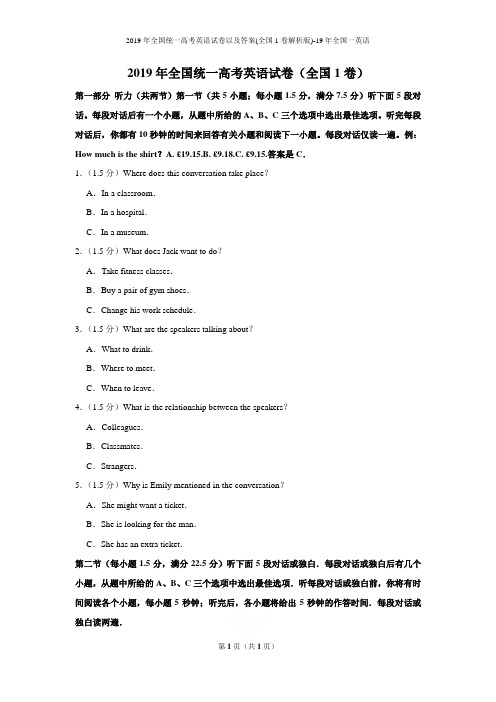
2019年全国统一高考英语试卷(全国1卷)第一部分听力(共两节)第一节(共5小题;每小题1.5分,满分7.5分)听下面5段对话。
每段对话后有一个小题,从题中所给的A、B、C三个选项中选出最佳选项。
听完每段对话后,你都有10秒钟的时间来回答有关小题和阅读下一小题。
每段对话仅读一遍。
例:How much is the shirt?A. £19.15.B. £9.18.C. £9.15.答案是C.1.(1.5分)Where does this conversation take place?A.In a classroom.B.In a hospital.C.In a museum.2.(1.5分)What does Jack want to do?A.Take fitness classes.B.Buy a pair of gym shoes.C.Change his work schedule.3.(1.5分)What are the speakers talking about?A.What to drink.B.Where to meet.C.When to leave.4.(1.5分)What is the relationship between the speakers?A.Colleagues.B.Classmates.C.Strangers.5.(1.5分)Why is Emily mentioned in the conversation?A.She might want a ticket.B.She is looking for the man.C.She has an extra ticket.第二节(每小题1.5分,满分22.5分)听下面5段对话或独白.每段对话或独白后有几个小题,从题中所给的A、B、C三个选项中选出最佳选项.听每段对话或独白前,你将有时间阅读各个小题,每小题5秒钟;听完后,各小题将给出5秒钟的作答时间.每段对话或独白读两遍.6.(3分)听材料,回答下列问题.(1)How long did James run his business?A.10 years.B.13 years.C.15 years.(2)How does the woman feel about James' situation?A.Embarrassed.B.Concerned.C.Disappointed.7.(4.5分)听材料,回答下列问题.(1)What has Kate's mother decided to do?A.Return to school.B.Change her job.C.Retire from work.(2)What did Kate's mother study at college?A.Oil painting.B.Art history.C.Business administration.(3)What is Kate's attitude toward her mother's decision?A.Disapproving.B.Ambiguous.C.Understanding.8.(4.5分)听材料,回答下列问题.(1)What is the man doing?A.Chairing a meeting.B.Hosting a radio program.C.Conducting a job interview.(2)What benefits Mary most in her job?A.Her wide reading.B.Her leaders' guidance.C.Her friends' help.(3)Who will Mary talk about next?A.Her teacher.B.Her father.C.Her mother.9.(6分)听材料,回答下列问题.(1)Why does the man seldom do exercise?A.He lacks motivation.B.He has a heart problem.C.He works all the time.(2)What does Jacob Sattelmair probably do?A.He's an athlete.B.He's a researcher.C.He's a journalist.(3)Why does the woman speak of a study?A.To encourage the man.B.To recommend an exercise.C.To support her findings.(4)How much time will the man probably spend exercising weekly?A.300 minutes.B.150 minutes.C.75 minutes.10.(4.5分)听材料,回答下列问题.(1)What did the scientists do to the road?A.They repaired it.B.They painted it.C.They blocked it.(2)Why are young birds drawn to the road surface?A.It's warm.B.It's brown.C.It's smooth.(3)What is the purpose of the scientists' experiment?A.To keep the birds there for a whole year.B.To help students study the birds well.C.To prevent the birds from being killed.第二部分阅读理解(共两节)第一节(满分30分)阅读下列短文,从每题所给的A、B、C和D四个选项中,选出最佳选项。
2019年高考英语试卷(新课标Ⅱ)(含解析版)

2019 年普通高等学校招生全国统一考试(新课标 II)英语注意事项:1.答卷前,考生务必将自己的姓名、准考证号填写在答题卡上。
2.回答选择题时,选出每小题答案后,用铅笔把答题卡上对应题目的答案标号涂黑。
如需改动,用橡皮擦干净后,再选涂其他答案标号。
回答非选择题时,将答案写在答题卡上,写在本试卷上无效。
3.考试结束后,将本试卷和答题卡一并交回。
第二部分阅读理解(共两节,满分 40 分) 第一节 (共 15 小题;每小题2 分,满分30 分)阅读下列短文,从每题所给的A、B、C 和D 四个选项中,选出最佳选项。
AMy Favourite BooksJo Usmar is a writer for Cosmopolitan and co-author of the This Book Will series(系列)of lifestyle books. Here she picks her top reads.MatildaRoaldDahlI once wrote a paper on the influence of fairy tales on Roald Dahl's writing and it gave me a new appreciation for his strange and delightful words. Matilda's battles with her cruel me parents and the bossy headmisres,Miss Trunchbull,are equally fumy and frightening,but they're also aspirational.After DarkHarukiMurakamiIt’s about two sisters-Eri,a model who either won’t or can’t stop sleeping ,and Mari, a young student . In trying to connect to her sister. Mari starts changing her life and discovers a world of diverse ”night people” who are hiding secrets.Gone GirlGillianFynnThere was a bit of me that didn't want to love this when everyone else on the planet did but the horror story isbrilliant. There's tension and anxiety from the beginning as Nick and Amy battle for your trust. It's a real whodunit and the frustration when you realise what's going on is horribly enjoyableThe StandStephen KingThis is an excellent fantasy novel from one of the best storytellers around. After a serious flu outbreak wipes out 99.4% of the world's population, a battle unfolds between good and evil among those let. Randall Flagg is one of the scariest characters ever.21.Who does "I" refer to in the text?A.Stephen King.B. Gillian Flynn.C Jo Usmar. D. Roald Dahl22.Which of the following tells about Mari and Eri?A.Cosmopolitan.B. Matilda.C. After Dark.D. The Stand.23.What kind of book is G one Girl?)A. A folk tale.B. A biography.C. A love story.D. A horror story.B“You can use me as a last resort(选择), and if nobody else volunteers,then I will do it.” This was an actual reply from a parent after I put out a request for volunteers for my kids lacrosse(长曲棍球)club.I guess that there's probably some demanding work schedule, or social anxiety around stepping up to help for an unknown sport. She may just need a little persuading . So I try again and tug at the heartstrings . I mention the single parent with four kids running the show and I talk about the dad coaching a team that his kids aren’t even on … At this point the unwilling parent speaks up,“Alright. Yes, I’ll do it.”I’m secretly relieved because I know there’s real power in sharing volunteer responsibilities among many. The unwilling parent organizes the meal schedule, sends out emails, and collects money for end-of-season gifts. Somewhere along the way, the same parent ends up becoming an invaluable member of the team. The coach is able to focus on the kids while the other parents are relieved to be off the hook for another season. Handing out sliced oranges to bloodthirsty kids can be as exciting as watching your own kid score a goal.Still, most of us volunteers breathe a sigh of relief when the season comes to a close. That relief is coupled witha deep understanding of why the same people keep coming back for more: Connecting to the community(社区)as you freely give your time, money, skills, or services provides a real joy. Volunteering just feels so good.In that sense, I’m pretty sure volunteering is more of a selfish act than I’d freely like to admit. However, if others benefit in the process, and I get some reward too, does it really matter where my motivation lies?24.What can we infer about the parent from her reply in paragraph l?A.She knows little about the club.B.She isn't good at sports.C.She just doesn't want to volunteer.D.She's unable to meet her schedule.25.What does the underlined phrase“tug at the heartstrings”in paragraph 2 mean ?A.Encourage team work.B.Appeal to feeling.C.Promote good deeds.D.Provide advice.26.What can we learn about the parent from paragraph 3?A.She gets interested in lacrosse.B.She is proud of her kids.C.She’ll work for another season.D.She becomes a good helper.27.Why does the author like doing volunteer work?A.It gives her a sense of duty.B.It makes her very happy.C.It enables her to work hard.D.It brings her material rewards.CMarian Bechtel sits at West Palm Beach’s Bar Louie counter by herself , quietly reading her e-book as she waits for her salad. What is she reading ? None of your business ! Lunch is Bechtel ’s “me” time. And like more Americans, she’s not alone.A new report found 46 percent of meals are eaten alone in America. More than half(53 percent)have breakfastalone and nearly half(46 percent)have lunch by themselves. Only at dinnertime are we eating together anymore,74 percent,according to statistics from the report.“I prefer to go out and be out. Alone,but together,you know?”Bechtel said,looking up from her book. Bechtel,who works in downtown West Palm Beach,has lunch with coworkers sometimes,but like many of us ,too often works through lunch at her desk. A lunchtime escape allows her to keep a boss from tapping her on the shoulder. She returns to work feeling energized. “Today,I just wanted some time to myself,”she said.Just two seats over,Andrew Mazoleny,a local videographer,is finishing his lunch at the bar. He likes that he can sit and check his phone in peace or chat up the barkeeper with whom he's on a first-name basis if he wants to have a little interaction(交流). “I reflect on how my day's gone and think about the rest of the week,” he said. “It' s a chance for self-reflection, You return to work recharged and with a plan.”That freedom to choose is one reason more people like to eat alone. There was a time when people may have felt awkward about asking for a table for one,but those days are over. Now,we have our smartphones to keep us company at the table. “It doesn't feel as alone as it may have before al the advances in technology,” said Laurie Demerit,whose company provided the statistics for the report.28.What are the statistics in paragraph 2 about?A.Food variety.B.Eating habits.C.Table manners.D.Restaurant service.29.Why does Bechtel prefer to go out for lunch?A.To meet with her coworkers.B.To catch up with her work.C.To have some time on her own.D.To collect data for her report.30.What do we know about Mazoleny?A.He makes videos for the bar.B.He’s fond of the food at the bar.C.He interviews customers at the bar.D.He’s familiar with the barkeeper.31.What is the text mainly about?A The trend of having meals alone.B. The importance of self-reflection.C. The stress from working overtime.D. The advantage of wireless technology.DBacteria are an annoying problem for astronauts. The microorganisms(微生物) from our bodies grow uncontrollably on surfaces of the International Space Station, so astronauts spend hours cleaning them up each week. How is NASA overcoming this very tiny big pro blem? It’s turning to a bunch of high school kids. But not just any kids. It depending on NASA HUNCH high school class, like the one science teachers Gene Gordon and Donna Himmelberg lead at Fairport High School in Fairport, New York.HUNCH is designed to connect high school classrooms with NASA engineers. For the past two years, Gordon’s students have been studying ways to kill bacteria in zero gravity, and they think they’re close to a solution(解决方案). “We don’t give the students any breaks. They have to do it just like NASA engineers,” says Florence Gold, a project manager.“There are no tests,” Gordon says. “There is no graded homework. There almost are no grades, other than‘Are you working towards your goal?’Basically, it’s ‘I’ve got to produce this product and then, at the end of year, present it to NASA.’Engineers come and really do an in-person review, and…it’s not a very nice thing at time. It’s a hard business review of your product.”Gordon says the HUNCH program has an impact(影响) on college admissions and practical life skills. “These kids are so absorbed in their studies that I just sit back. I don’t teach.” And that annoying bacteria? Gordon says his students are emailing daily with NASA engineers about the problem, readying a workable solution to test in space.32 What do we know about the bacteria in the International Space Station?A. They are hard to get rid of.B. They lead to air pollution.C. They appear different forms.D. They damage the instruments.33.What is the purpose of the HUNCH program?A. To strengthen teacher-student relationships.B. To sharpen students’ communication skills.C.To allow students to experience zero gravity. D. To link space technology with school education34.What do the NASA engineers do for the students in the program?A.Check their product.B. Guide project designsC. Adjust work schedules.D. Grade their homework.35.What is the best title for the text?A.NASA: The Home of Astronauts.B.Space: The Final Homework Frontier.C.Nature: An Outdoor Classroom.D.HUNCH:A College Admission Reform.第二节 (共 5 小题;每小题 2 分,满分10 分)根据短文内容,从短文后的选项中选出能填入空白处的最佳选项。
2019年全国统一高考英语试卷(新课标Ⅰ)(含答案)

2019年普通高等学校招生全国统一考试(全国卷I)英语注意事项:1.答卷前,考生务必将自己的姓名、准考证号填写在答题卡上。
2.回答选择题时,选出每小题答案后,用铅笔把答题卡上对应题目的答案标号涂黑。
如需改动,用橡皮擦干净后,再选涂其他答案标号。
回答非选择题时,将答案写在答题卡上,写在本试卷上无效。
3.考试结束后,将本试卷和答题卡一并交回。
第一部分听力(共两节,满分30分)做题时,先将答案标在试卷上。
录音内容结束后,你将有两分钟的时间将试卷上的答案转涂到答题卡上。
第一节 (共5小题;每小题1.5分,满分7.5分)听下面5段对话。
每段对话后有一个小题,从题中所给的A、B、C三个选项中选出最佳选项。
听完每段对话后,你都有10秒钟的时间来回答有关小题和阅读下一小题。
每段对话仅读一遍。
例:How much is the shirt?A. £19.15.B. £9.18.C. £9.15.答案是C。
1.Where does this conversation take place?A. In a classroom.B. In a hospital.C. In a museum. 【答案】B2.What does Jack want to do?A. Take fitness classes.B. Buy a pair of gym shoes.C. Change his work schedule.【答案】A3.What are the speakers talking about?A. What to drink.B. Where to meet.C. When to leave. 【答案】B4.What is the relationship between the speakers?A. Colleges.B. Classmates.C. Strangers.【答案】C5.Why is Emily mentioned in the conversation?A. She might want a ticket.B. She is looking for the man.C. She has an extra ticket.【答案】A第二节(共15小题,每小题1.5分,满分22.5分)听下面5段对话或独白。
2019年全国高考英语真题及参考答案汇总

2019年全国高考英语试题及答案目录2019年普通高等学校招生全国统一考试(全国卷I) (2)2019年普通高等学校招生全国统一考试(全国卷I)参考答案 (12)2019年普通高等学校招生全国统一考试(全国卷II) (13)2019年普通高等学校招生全国统一考试(全国卷II)参考答案 (23)2019年普通高等学校招生全国统一考试(全国卷III) (24)2019年普通高等学校招生全国统一考试(全国卷III)参考答案 (34)2019年普通高等学校招生全国统一考试(北京卷) (35)2019年普通高等学校招生全国统一考试(北京卷)参考答案 (45)2019年普通高等学校招生全国统一考试(江苏卷) (47)2019年普通高等学校招生全国统一考试(江苏卷)参考答案 (61)2019年普通高等学校招生全国统一考试(天津卷) (63)2019年普通高等学校招生全国统一考试(天津卷)参考答案 (76)2019年6月普通高等学校招生全国统一考试(浙江卷) (79)2019年普通高等学校招生全国统一考试(浙江卷)参考答案 (88)绝密★启用前2019年普通高等学校招生全国统一考试(全国卷I)英语注意事项:1.答卷前,考生务必将自己的姓名、准考证号填写在答题卡和试卷指定位置上。
2.回答选择题时,选出每小题答案后,用铅笔把答题卡上对应题目的答案标号涂黑。
如需改动,用橡皮擦干净后,再选涂其他答案标号。
回答非选择题时,将答案写在答题卡上,写在本试卷上无效。
3.考试结束后,将本试卷和答题卡一并交回。
第一部分听力(共两节,满分30分)做题时,先将答案标在试卷上。
录音内容结束后,你将有两分钟的时间将试卷上的答案转涂到答题卡上。
第一节(共5小题;每小题1.5分,满分7.5分)听下面5段对话。
每段对话后有一个小题,从题中所给的A、B、C三个选项中选出最佳选项。
听完每段对话后,你都有10秒钟的时间来回答有关小题和阅读下一小题。
每段对话仅读一遍。
2019年全国高考英语真题试卷(共6套详细解析版)
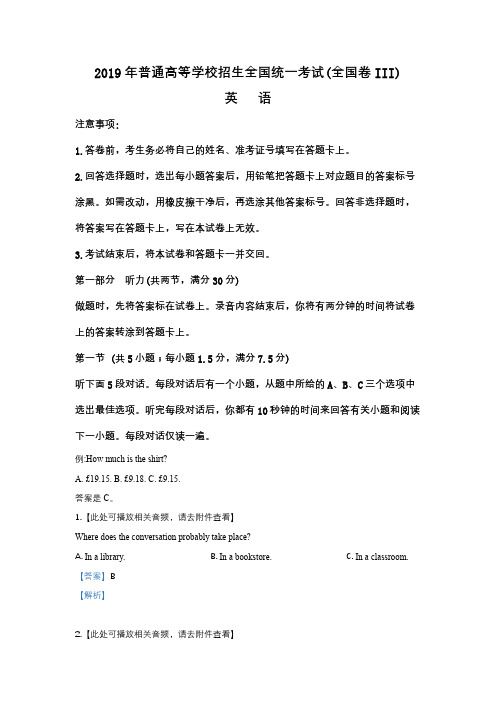
Lin-Manuel Miranda wrote this musical about Alexander Hamilton,in which the birth of America is presented as an immigrant story. Thomas Kail directs. In previews. Opens Feb. 17.(Public,425 Lafayette St. 212-967-7555.)
2019年普通高等学校招生全国统一考试(全国卷III)
英语
注意事项:
1.答卷前,考生务必将自己的姓名、准考证号填写在答题卡上。
2.回答选择题时,选出每小题答案后,用铅笔把答题卡上对应题目的答案标号涂黑。如需改动,用橡皮擦干净后,再选涂其他答案标号。回答非选择题时,将答案写在答题卡上,写在本试卷上无效。
【答案】B
【解析】
4.【此处可播放相关音频,请去附件查看】
What does the man tell Jane to do?
A.Postpone his appointment.B.Meet Mr. Douglas.C.Return at 3 o’clock.
【答案】A
【解析】
5.【此处可播放相关音频,请去附件查看】
阅读下列短文,从每题所给的A、B、C和D四个选项中,选出最佳选项。
A
OPENINGS AND PREVIEWS
Animals Out of Paper
Yolo!Productions and the Great Griffon present the play by Rajiv Joseph,in which an origami(折纸术) artist invites a teenage talent and his teacher into her studio. Merri Milwe directs. In previews. Opens Feb. 12. (West Park Presbyterian Church,165 W. 86th St. 212-868-4444.)
(word完整版)2019年高考英语全国1卷(附答案).doc
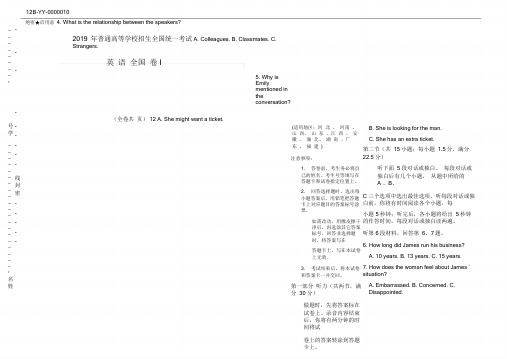
12B-YY-0000010_ _ _ _ _ _ _ _ :绝密★启用前4. What is the relationship between the speakers?-2019年普通高等学校招生全国统一考试 A. Colleagues. B. Classmates. C.Strangers.-英语全国卷 I-5. Why isEmilymentioned intheconversation? -(全卷共页) 12 A. She might want a ticket.号学_ _ _ _ _ _ _ _ _ _ _ _ _ _ _ _ _ _ _ _ :名姓-----线封密-----(适用地区:河北、河南、山西、山东、江西、安徽、湖北、湖南、广东、福建)注意事项:1.答卷前,考生务必将自己的姓名、考生号等填写在答题卡和试卷指定位置上。
2.回答选择题时,选出每小题答案后,用铅笔把答题卡上对应题目的答案标号涂黑。
如需改动,用橡皮擦干净后,再选涂其它答案标号,回答非选择题时,将答案写在答题卡上,写在本试卷上无效。
3.考试结束后,将本试卷和答案卡一并交回。
第一部分听力(共两节,满分30 分)做题时,先将答案标在试卷上。
录音内容结束后,你将有两分钟的时间将试卷上的答案转涂到答题卡上。
B. She is looking for the man.C. She has an extra ticket.第二节(共15小题;每小题 1.5分,满分22.5分)听下面5段对话或独白。
每段对话或独白后有几个小题,从题中所给的A 、B、C三个选项中选出最佳选项。
听每段对话或独白前,你将有时间阅读各个小题,每小题5秒钟;听完后,各小题将给出5秒钟的作答时间。
每段对话或独白读两遍。
听第6段材料,回答第6、7题。
6. How long did James run his business?A. 10 years.B. 13 years.C. 15 years.7. How does the woman feel about James ’situation?A. Embarrassed.B. Concerned.C.Disappointed.第一节(共 5 小题;每小题 1.5 分,满分7.5 分)班__ __ _ _ _ 年_ _ _ _ _ _ _ _ _ _ _ _ _ _ _ _ _ _ _ _ _ _ _ _ _ _ ----线封密--------听下面5 段对话。
【高考卷】2019年全国卷Ⅰ英语试卷及答案

2019年普通高等学校招生全国统一考试(全国卷I)第一部分听力(共两节,满分30分)第一节(共5小题;每小题1.5分,满分7.5分)听下面5段对话。
每段对话仅读一遍。
1.Where does this conversation take place?A. In a classroom.B. In a hospital.C. In a museum.2.What does Jack want to do?A. Take fitness classes.B. Buy a pair of gym shoes.C. Change his work schedule.3.What are the speakers talking about?A. What to drink.B. Where to meet.C. When to leave.4.What is the relationship between the speakers?A. Colleagues.B. Classmates.C. Strangers.5.Why is Emily mentioned in the conversation?A. She might want a ticket.B. She is looking for the man.C. She has an extra ticket.第二节(共15小题,每小题1.5分,满分22.5分)听下面5段对话或独白,每段对话或独白读两遍。
听第6段材料,回答第6、7题。
6.How long did James run his business?A.10 years.B.13years.C.15 years.7.How does the woman feel about James' situation?A. Embarrassed.B. Concerned.C. Disappointed. 听第7段材料,回答第8至10题。
2019年全国统一高考英语试卷听力+原文+答案(新课标i)
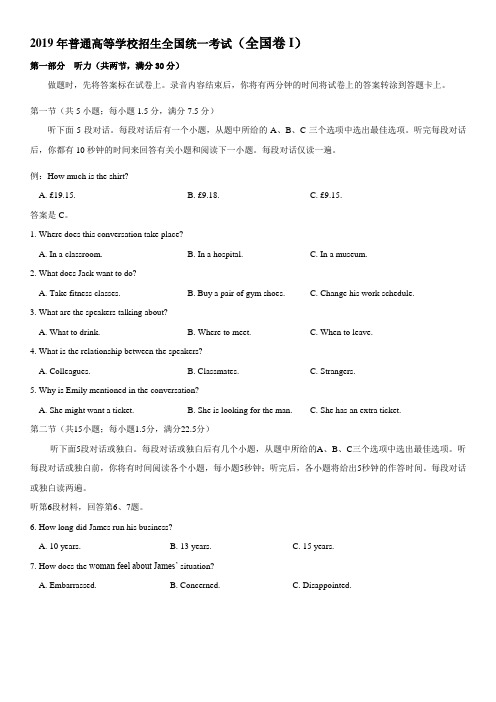
2019年普通高等学校招生全国统一考试(全国卷I)第一部分听力(共两节,满分30分)做题时,先将答案标在试卷上。
录音内容结束后,你将有两分钟的时间将试卷上的答案转涂到答题卡上。
第一节(共5小题;每小题1.5分,满分7.5分)听下面5段对话。
每段对话后有一个小题,从题中所给的A、B、C三个选项中选出最佳选项。
听完每段对话后,你都有10秒钟的时间来回答有关小题和阅读下一小题。
每段对话仅读一遍。
例:How much is the shirt?A. £19.15.B. £9.18.C. £9.15.答案是C。
1. Where does this conversation take place?A. In a classroom.B. In a hospital.C. In a museum.2. What does Jack want to do?A. Take fitness classes.B. Buy a pair of gym shoes.C. Change his work schedule.3. What are the speakers talking about?A. What to drink.B. Where to meet.C. When to leave.4. What is the relationship between the speakers?A. Colleagues.B. Classmates.C. Strangers.5. Why is Emily mentioned in the conversation?A. She might want a ticket.B. She is looking for the man.C. She has an extra ticket.第二节(共15小题;每小题1.5分,满分22.5分)听下面5段对话或独白。
2019年高考真题英语(全国卷Ⅲ含解析)
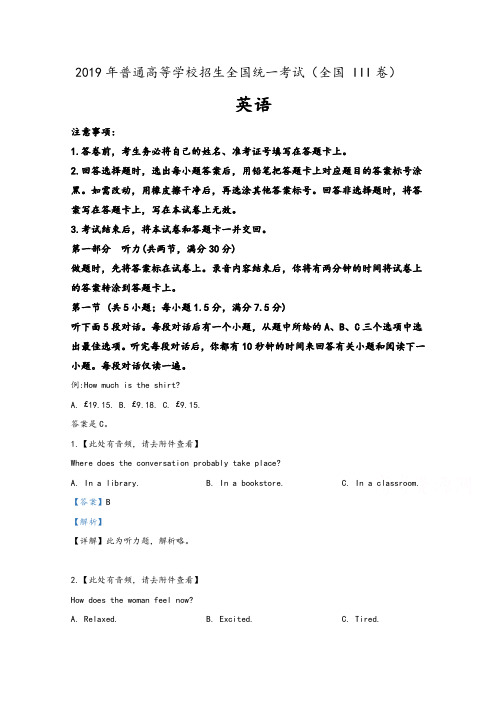
2019年普通高等学校招生全国统一考试(全国 III卷)英语注意事项:1.答卷前,考生务必将自己的姓名、准考证号填写在答题卡上。
2.回答选择题时,选出每小题答案后,用铅笔把答题卡上对应题目的答案标号涂黑。
如需改动,用橡皮擦干净后,再选涂其他答案标号。
回答非选择题时,将答案写在答题卡上,写在本试卷上无效。
3.考试结束后,将本试卷和答题卡一并交回。
第一部分听力(共两节,满分30分)做题时,先将答案标在试卷上。
录音内容结束后,你将有两分钟的时间将试卷上的答案转涂到答题卡上。
第一节 (共5小题;每小题1.5分,满分7.5分)听下面5段对话。
每段对话后有一个小题,从题中所给的A、B、C三个选项中选出最佳选项。
听完每段对话后,你都有10秒钟的时间来回答有关小题和阅读下一小题。
每段对话仅读一遍。
例:How much is the shirt?A. £19.15.B. £9.18.C. £9.15.答案是C。
1.【此处有音频,请去附件查看】Where does the conversation probably take place?A. In a library.B. In a bookstore.C. In a classroom. 【答案】B【解析】【详解】此为听力题,解析略。
2.【此处有音频,请去附件查看】How does the woman feel now?A. Relaxed.B. Excited.C. Tired.【答案】C【解析】【详解】此为听力题,解析略。
3.【此处有音频,请去附件查看】How much will the man pay?A. $520.B. $80.C. $100.【答案】B【解析】【详解】此为听力题,解析略。
4.【此处有音频,请去附件查看】What does the man tell Jane to do?A. Postpone his appointment.B. Meet Mr. Douglas.C. Return at 3o’clock.【答案】A【解析】【详解】此为听力题,解析略。
(完整版)2019年高考英语全国3卷(附答案)

学校:___________________________年_______班姓名:____________________学号:________---------密封线---------密封线---------绝密★启用前2019年普通高等学校招生全国统一考试英语全国III 卷(全卷共12页)(适用地区:云南、广西、贵州、四川)注意事项:1.答卷前,考生务必将自己的姓名、考生号等填写在答题卡和试卷指定位置上。
2.回答选择题时,选出每小题答案后,用铅笔把答题卡上对应题目的答案标号涂黑。
如需改动,用橡皮擦干净后,再选涂其它答案标号,回答非选择题时,将答案写在答题卡上,写在本试卷上无效。
3.考试结束后,将本试卷和答案卡一并交回。
第一部分听力(共两节,满分30分)做题时,先将答案标在试卷上。
录音内容结束后,你将有两分钟的时间将试卷上的答案转涂到答题卡上。
第一节(共5小题;每小题1.5分,满分7.5分)听下面5段对话。
每段对话后有一个小题,从题中所给的A 、B 、C 三个选项中选出最佳选项。
听完每段对话后,你都有10秒钟的时间来回答有关小题和阅读下一小题。
每段对话仅读一遍。
例:How much is the shirt?A. £19.15.B. £9.18.C. £9.15.答案是C 。
1. Where does the conversation probably take place?A. In a library.B. In a bookstore.C. In a classroom.2. How does the woman feel now?A. Relaxed.B. Excited.C. Tired.3. How much will the man pay? A. $520. B. $80.C. $100.4. What does the man tell Jane to do?A. Postpone his appointment.B. Meet Mr. Douglas.C. Return at 3 o ’clock.5. Why would David quit his job? A. To go back to school. B. To start his own firm. C. To work for his friend.第二节(共15小题;每小题1.5分,满分22.5分)听下面5段对话或独白。
2019年高考英语真题(全国卷I)含答案
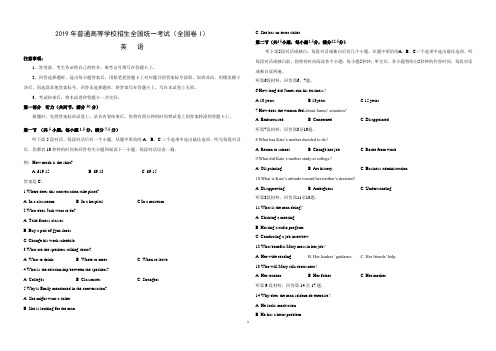
2019年普通高等学校招生全国统一考试(全国卷I)英语注意事项:1.答卷前,考生务必将自己的姓名、准考证号填写在答题卡上。
2.回答选择题时,选出每小题答案后,用铅笔把答题卡上对应题目的答案标号涂黑。
如需改动,用橡皮擦干净后,再选涂其他答案标号。
回答非选择题时,将答案写在答题卡上,写在本试卷上无效。
3.考试结束后,将本试卷和答题卡一并交回。
第一部分听力(共两节,满分30分)做题时,先将答案标在试卷上。
录音内容结束后,你将有两分钟的时间将试卷上的答案转涂到答题卡上。
第一节(共5小题;每小题1.5分,满分7.5分)听下面5段对话。
每段对话后有一个小题,从题中所给的A、B、C三个选项中选出最佳选项。
听完每段对话后,你都有10秒钟的时间来回答有关小题和阅读下一小题。
每段对话仅读一遍。
例:How much is the shirt?A. £19.15.B. £9.18.C. £9.15.答案是C。
1.Where does this conversation take place?A. In a classroom.B. In a hospital.C.In a museum.2.What does Jack want to do?A. Take fitness classes.B. Buy a pair of gym shoes.C. Change his work schedule.3.What are the speakers talking about?A. What to drink.B. Where to meet.C. When to leave.4.What is the relationship between the speakers?A. Colleges.B. Classmates.C. Strangers.5.Why is Emily mentioned in the conversation?A. She might want a ticket.B. She is looking for the man.C. She has an extra ticket.第二节(共15小题,每小题1.5分,满分22.5分)听下面5段对话或独白。
- 1、下载文档前请自行甄别文档内容的完整性,平台不提供额外的编辑、内容补充、找答案等附加服务。
- 2、"仅部分预览"的文档,不可在线预览部分如存在完整性等问题,可反馈申请退款(可完整预览的文档不适用该条件!)。
- 3、如文档侵犯您的权益,请联系客服反馈,我们会尽快为您处理(人工客服工作时间:9:00-18:30)。
2019北京高考英语真题第一部分:知识运用(共两节,45分)第一节语法填空(共10小题:每小题1.5分,共15分)阅读下列短文,根据短文内容填空。
在未给提示词的空白处仅填写1个适当AOn the first day of my first grade, I stood by the door with butterflies in my stomach. I 1 (voice) my biggest concern to my mother, "How will I make friends?"." She handed me advice. "Be yourself." For the past 20 years. I have lived by these words. Soon I will graduate and become part of the real world. Nervously 2 (face) challenges, I know I will whisper to 3 (I) the two simple words "Be yourself"BEarth Day, 4 (mark) on 22 April, is an annual event aiming to raise public awareness about environmental protection. First celebrated 5 1970, the Day now includes events in more than 190 countries and regions(地区). No matter what you like to do. There is a way to get involved in various6 (activity) on Earth Day. You can plant a tree, make a meal with locally grown vegetables, or save power-the possibilities are endless.CDoes the name of the college you attend really matter? Research on the question 7 (suggest) that, for most students, it doesn't. What students do at college seems to matter much more than 8 they go. The students benefitting most from college are those 9 are totally engaged (参与) in academic life. taking full advantage of the college's chances and resources (资源). Students should have a proper attitude towards college before thinking about which college to attend, and it's never too early to make necessary preparations for a healthy and 10 (meaning) college experience.第二节完形填空(共20道小题:每小题1.5分,共30分)阅读下面短文,掌握其大意,从每题给出的A、B、C、D四个选项中,选出最佳选项,并在答题卡上将该项涂黑。
Regardless of the weather or the distance, Paul Wilson will make sure low-income students in his neighborhood arrive at their col1ege classes on time.A retired engineer, 76-year-old Wilson has been 11 free rides to college students for the past eight years. Since he first started 12 his car ti the young People, Wilson has 13 an astonishing 64.000 miles, and has had countless pleasant and often humorous 14 with the students he transports to and from school. The students who he's 15 have gone on to become physicians, teachers and engineers, but what they've also got out of their time in school is finding a role model and a friend in Wilson. Some students 16 call him "Grandpa".Tina Stern 17 rides from Wilson for all her four years in college, and the trips meant much more to her than lust free 18 . "It's not just a ride; you're not just sitting there in 19 silence or with your headphones on." Stern said. "He asks you questions and actually 20 the answers. so the next time you ride with him, he'll 21 those things."Wilson first worked as a driver through a student-support programme of the non-profit organisation. On Point for College. Although the 22 asks the members only to drive students to and from their classes. Wilson often goes 23 to ensure the welfare and safety of the students. If they have problems with registration. Wilson is there to 24 them. If they run out of certain daily necessities, Wilson will drive to the nearest store and purchase what's needed, If a student gets hungry on the long drives to and from school. Wilson never 25 to buy them a meal.For many students, Wilson's help is not only appreciated, it's also entirely 26 for them to be able to complete their college education. Some students don't have a reliable car, while others have to 27 vehicles with parents who work six days a week. For them, riding with Wilson has 28 them to complete their education-hut according to Wilson, he benefits just as much from the 29 . "I just love driving, and I love these kids," Wilson said. "It's such a(n) 30 to be a part of these kids' lives, even just for a few hours, getting to know them and hearing their stories."11. A. linking B. sending C. offering D. distributing12. A. donating B. lending C. delivering D. volunteering13. A. paved B. covered C. measured D. wandered14 A. arguments B. interviews C. negotiations D. conversations15. A. met B. driven C. addressed D. greeted16. A. even B. ever C. once D. already17. A. earned B. received C. assessed D. demanded18. A. transportation B. style C. time D. communication19. A. forced B. awkward C. ridiculous D. suspicious20. A. selects B. recites C. guesses D. remembers21. A. act on B. settle on C. check on D. agree on22. A. club B. league C. college D. programme23. A. far B. around C. beyond D. forwards24. A. assist B. watch C. urge D. warn25. A. expects B. attempts C. manages D. hesitates26. A. extra B. unusual C. necessary D. adequate27. A. share B. fuel C. repair D. exchange28. A. required B. allowed C. reminded D. convinced29. A. experience B. arrangement C. appreciation D. employment30. A. effort B. ambition C. privilege D. convenience第二部分:阅读理解(共两节,40分)第一节(共15小题:每小题2分,共30分)阅读下列短文,从每题所给的A、B、C、D四个选项中,选出最佳选项,并在答题卡上将该项涂黑。
